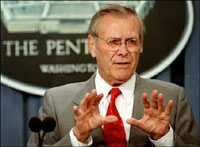Washington seriously concerned about Southeast Asia
Donald Rumsfeld is busy waging war on terror. Therefore, he almost has no time to visit foreign lands. Predictably enough, Iraq and Afghanistan, two front-line countries involved in this unrelenting war, sit high on Rumsfeld’s travel agenda. Contrary to his usual destinations, U.S. defense secretary toured Southeast Asia last week. He visited Singapore, Vietnam, and Indonesia. Given his tough schedule, Donald Rumsfeld had, without doubt, serous reasons to visit those countries.

Apart from the Middle East, today’s Southeast Asia is probably the second most important part of the world in terms of geopolitical significance. The point is that a hefty chunk of the international trade, in particular oil and natural gas supplies by sea, is shipped by tankers through the Straight of Malacca, a straight between Sumatra and the Malay Peninsula. In the meantime, a sociopolitical situation in the region is a far cry from being stable. The population is on the rise while the grounds for conflict are aplenty.
In contrast with his nondescript trip to Singapore where he virtually regulated his clock to that of a reliable ally in the exceptionally important strategic area of the world, Rumsfeld also had to deal with political issues while visiting Vietnam and Indonesia in particular.
Rumsfeld is the second head of the Pentagon who has visited Vietnam since the end of the war between the two countries. Reports on the talks were pretty scarce. Judging by the fervor with which Rumsfeld was assuring the journalists on a press conference that U.S. has no plans of opening military bases in Vietnam, even those scanty reports seem to indicate that Washington does have the intention.
U.S. defense secretary also spoke about Vietnam’s economic achievements. The economy is doing fine, the state is getting richer as extra cash is flowing into the coffers. Needless to say, the U.S. is very keen to see Vietnam allocate those funds for purchasing arms and equipment made by U.S. military-industrial complex.
By all appearances, issues relating to U.S. arms export also topped the agenda during the talks in Jakarta. Lately U.S. arms manufacturers haven’t shown a lot of enthusiasm as to U.S.-Indonesia cooperation. Several years ago, some zealous supporters of democracy and defenders of human rights in U.S. Congress imposed a ban on military and technical cooperation between America and Indonesia following an exceedingly cruel approach of Indonesia to the issue of independence of East Timor. Up until 1999, Jakarta used heavy-handed tactics in persuading residents of East Timor to renounce the idea of an independent state.
Eventually, the ban was lifted in November 2005 though bilateral cooperation has not yet reach the level of cooperation during Suharto’s rule, the regime that was fully supported by the Americans. Moreover, military and technical cooperation between Indonesia and Russia continues developing. The Indonesian leaders are apparently trying to make the most of the situation because they are perfectly aware of Indonesia’s appeal to the U.S. at the moment as a potential arms buyer.
Speaking on a press conference at the end of the talks in Jakarta, Indonesian defense minister even had the nerve to chide the U.S. for interfering too much in the domestic affairs of certain countries. He suggested that Washington stop lecturing the governments of those states on ways to combat international terrorism. Rumsfeld undoubtedly raised the issue of international terrorism during the talks in the Indonesian capital.
America is getting increasingly concerned about the recent mushroom growth of Islamic fundamentalism in the world’s biggest Muslim country.
In actuality, the central government’s sway over a number of provinces scattered about the vast country keeps shrinking as influential governors step up their efforts to adopt the shari‘ah law. The number of Indonesians who profess their Muslim identity is growing. Taking into account today’s political situation in the world, declaring one’s Muslim identity is next to admitting one’s anti-Americanism.
It is still too early to estimate success of Rumsfeld’s tour across Southeast Asia. However, it is obvious that Washington has begun to pay more attention to the region whose present-day developments pose a threat to global security. It is also understood that Russia may play an important role in curbing negative trends in Southeast Asia. It is thought that Moscow is going to take a stronger line over its policy in the region.
Politcom
Translated by Guerman Grachev
Pravda.Ru
Discuss this article on Pravda.Ru English Forum
Subscribe to Pravda.Ru Telegram channel, Facebook, RSS!




